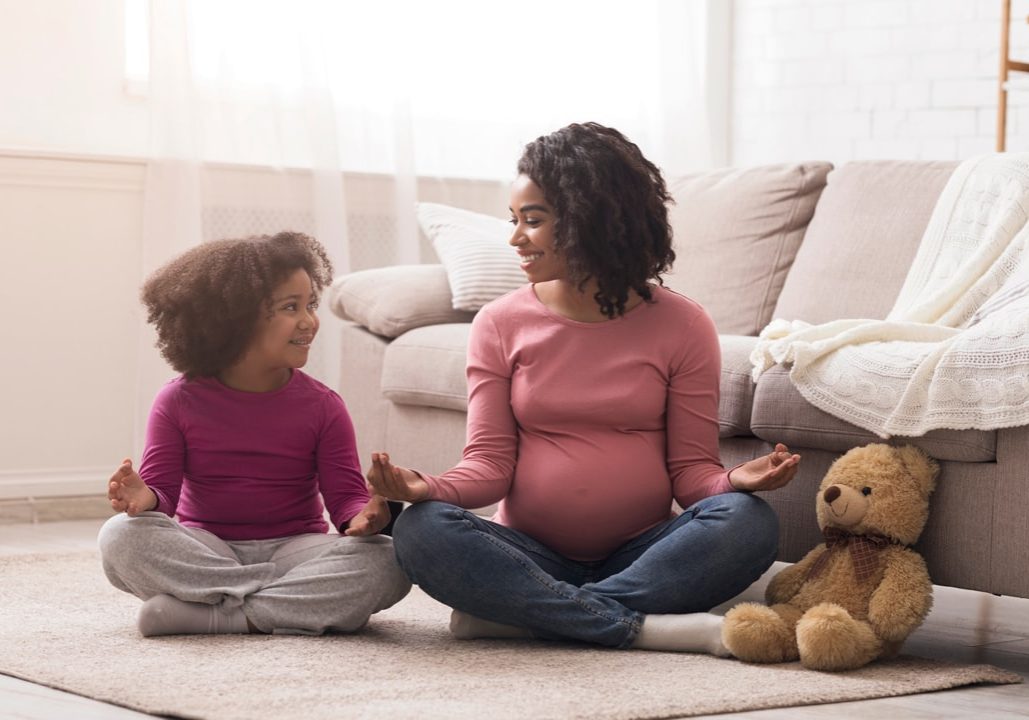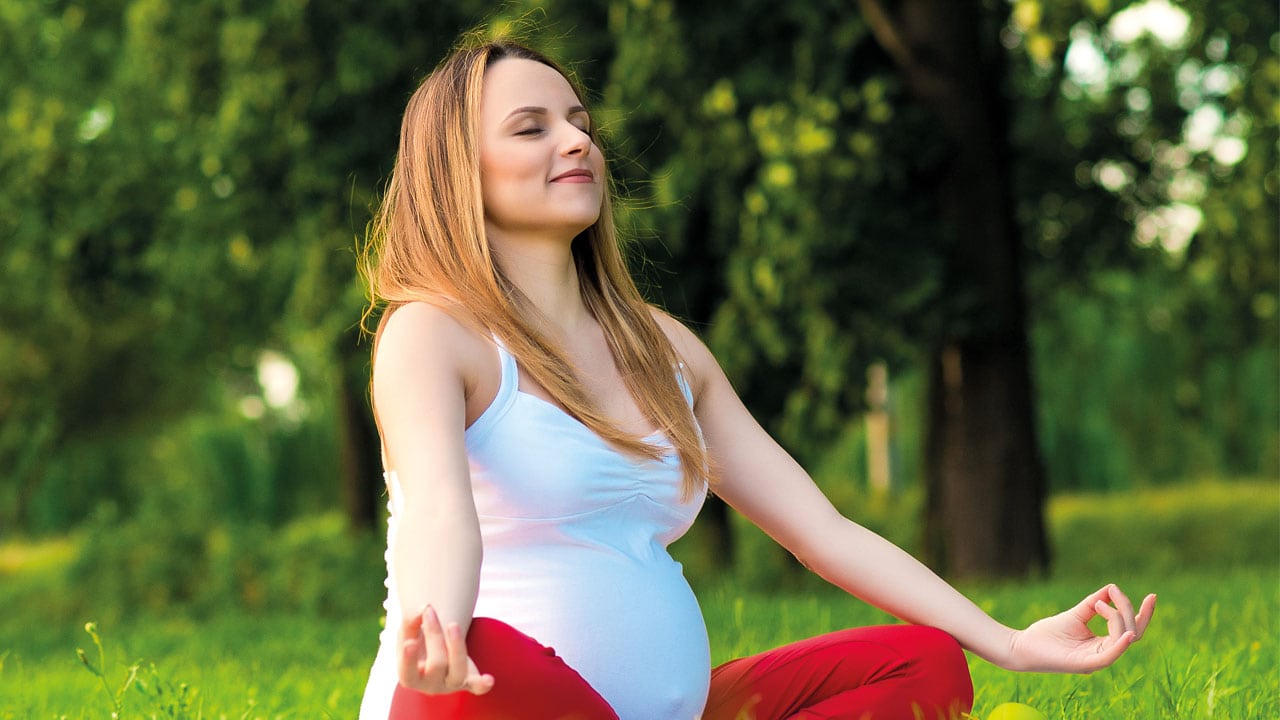
Meditation for pregnancy and children
Meditation tips for each stage of pregnancy. By Jennifer Clarke
Pre-pregnancy
Getting pregnant can be a challenge for some women so I wanted to acknowledge this and mention that the tips here for the first trimester can also apply to ladies who are monitoring their fertility or preparing themselves for pregnancy. I have worked with women who have regulated their monthly cycle, overcome anxieties and learned to better cope with PTSD by introducing meditation as a regular practice. Relationships can improve, bodies can repair and minds can be settled by simply focusing on your breathing for a few minutes every day.
First trimester (1 to 12 weeks)
During the first trimester your body is going through so many changes. These changes can leave you feeling particularly tired and you might experience aches and pains as your body starts to adjust to your little bundle of joy. Morning sickness (should be called ‘all the time sickness!’) could be a factor for you too.
My top tip for this stage of pregnancy is to get into the habit of meditating daily. Find a comfortable position, either laying down or sitting; and start with a 5-minute breathing exercise. Try to do this every day and aim to be meditating for 20 minutes each day by the end of your first trimester.
Second trimester (13 to 27 weeks)
Your pregnancy will start to become visible during the second trimester and, as your baby starts to grow, it is important to think about the food choices you are making. Along with your daily meditations, why not try some mindful eating? Here is a little guide to introduce you to the concept and help you to give it a try:
Consider what you buy: think about the health value of each item and make a shopping list, then try to stick to it without adding sugary impulse buys.
Eat when you are hungry...but not so hungry that your main objective is to get food into your belly at any cost! Come to the table with composure and enjoy the ceremony of the occasion.
Small portions: you can always have multiple plates to make sure that you have what you and your baby need, but the idea here is to…
… Appreciate each serving that you have chosen to put onto your plate!
Bring each of your senses to the meal: at each stage, preparation, cooking, serving, eating, be aware of the colours, the aromas, the textures, even the sounds. Enjoy identifying the spices and flavours that have come together to create your meal.
Take small bites: your sensory adventure will be easier and more fulfilling with smaller mouthfuls. Try putting your cutlery down between bites, noting how the cutlery is placed and how it feels in your hand when you pick it up again.
Chew, chew, chew: chewing food well is a great idea for aiding digestion and preventing overeating. Anything that can help you to avoid discomfort during your pregnancy is a good idea, so give it a try. Some people say flavours are more prominent with longer chewing and that we get greater nutritional value from our food if we chew it well (20-40 chews of a single mouthful might be more than you have ever done before, but it is not considered too much when mindful eating!).
Eat slowly: if you have been following the points above then you certainly won’t be wolfing down your food! Enjoy the sensations of eating and appreciate the good nourishment and satisfaction that your chosen meal is bringing to you and your baby.
This stage of your pregnancy is such a beautiful time. Try to be present in this trimester whenever you can. We can be mindful in anything that we do, by simply taking a moment to acknowledge our senses and the task at hand. Continue practicing meditation every day throughout this trimester: it is important to establish a daily habit if you want to experience the optimal benefits. Take this special time to really connect with your environment, your body and your baby.

Third trimester (28 to 40 weeks)
As you prepare to meet baby (no matter if this is your first-born or your fourth!), each time will be different and magical in its own way. Depending on how you are feeling, meditation can help you manage anxiety and stress, which are natural for you to be experiencing at this time.
You are likely to find it increasingly difficult to get comfortable during trimester three thanks to your ever-expanding baby bump; so it is more important than ever to remember that meditation promotes emotional positivity and emotional stability. I would encourage you to listen to guided meditations throughout this trimester as these can help you to shift focus away from any pains and strains you may be experiencing and because listening to a pre-recording might be much easier than trying to squish you and a little passenger into the lotus position! The most important thing is to continue your daily practice (I have made some audio files free-to-download from my website if you wish to utilise this resource).
Meditation can boost oxytocin, a beneficial hormone which floods your body when you meditate and when you breastfeed. But we also flood our bodies with a different hormone, cortisol, when we are under stress, which can have some adverse effects. Considering oxytocin has the direct opposite effect to cortisol, every time we meditate (or breastfeed!) we are directly combating the feelings and the effects of stress. Take advantage of this. I want you to feel like you can cope. I want you to meditate.
Post-pregnancy
Now that your baby has arrived you may find that your emotions are heightened, sleep is a luxury and your body is going through more changes. Taking time for you is extremely important, now more than ever. Remember you are the most important person in your world: if you are okay, then everyone else around you will be okay. I have helped many mothers start their meditation practice and they have reported, within the first seven days of spending 5 minutes per day doing breathing exercises that their overall wellbeing has improved. You have done a magical and amazing thing to bring a baby into this world and you deserve to take a few minutes each day for yourself, to recharge your energies, to allow your thoughts to slow and to give yourself a little top-up of oxytocin.
I hope that I have been able to convince you that just by becoming aware of your breath, you can experience some amazing benefits to your overall wellbeing and mental health. If you would like to learn more about the science behind meditation, then please visit my website for more details.
One final thought: it is also a really good idea to encourage your children to meditate regularly. There are many fun games you can play with your children to get them started…but that is another article, for another day!
Jennifer Clarke is founder and lead teacher of MeditationCourses.co.uk
Meditation benefits
- Better sleep
- Reduced stress levels
- Improved self-esteem
- Reduced symptoms of depression
- Better focus and concentration
- Reduced anxiety



